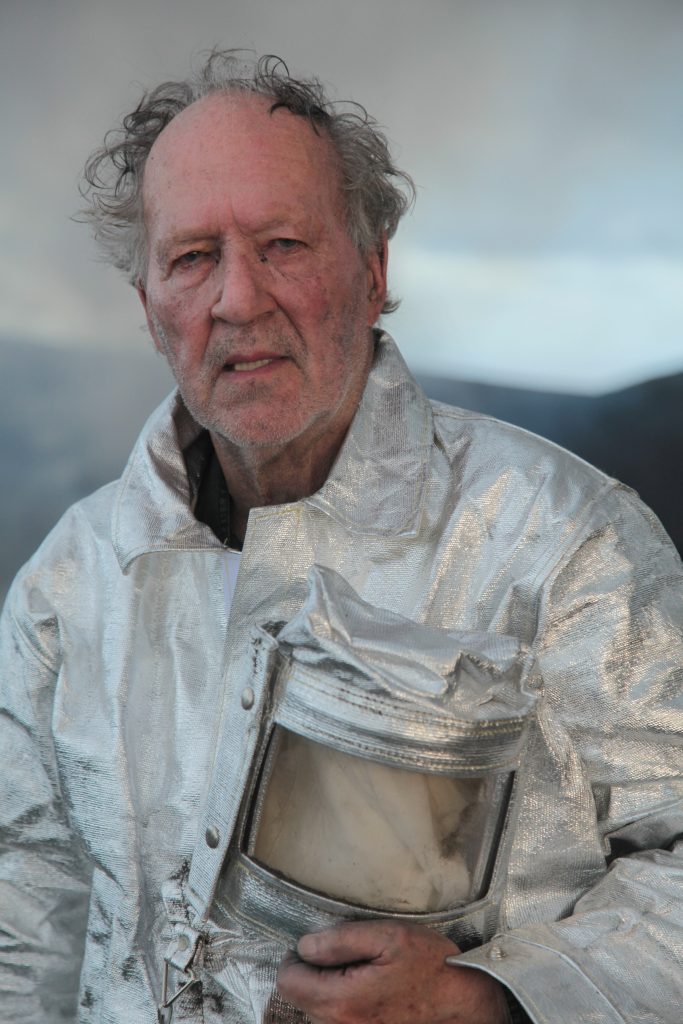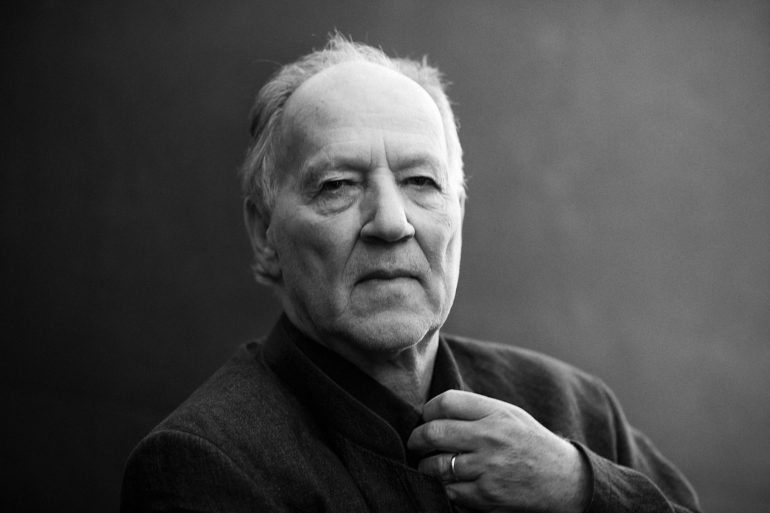Last Sunday Werner Herzog, one of the greatest figures in new German cinema, was welcomed by the International Literature Festival Dublin for a public talk in the National Concert Hall.
Having made his first film at the age of nineteen and produced, written and directed over seventy films to date, with fifty awards under his belt, one would be hard pressed to find a film-maker with a CV as extensive as Herzog’s. Coming to prominence in the 70s with strange art house classics like The Enigma of Kaspar Hauser (1974), Heart of Glass(1976) and Stroszek(1977), he then went on to gain international recognition with a series of cinematic collaborations with leading man Klaus Kinski; Aguirre, the Wrath of God(1972), Woyzec (1979), Nosferatu the Vampyre(1979), Fitzcarraldo(1982) and Cobra Verde (1985).
In recent decades Herzog has concentrated on non fiction work, becoming a celebrated documentarian with the Oscar-nominated Grizzly Man (2005), acclaimed TV series On Death Row(2012), and the recent Lo And Behold -Reveries of a Connected World (2015) and Into The Inferno (2016) . In addition to his film repertoire, the quirky Herzog has also appeared in Parks and Recreation, apparently saved Joaquin Phoenix’s life and has eaten a shoe.
Arts Officer for Dublin City Council Ray Yates, addressed a sold-out auditorium of eager fans by introducing the chair of the talk Irish writer and television director Carlo Gébler and the man we were all there to see, the film marvel that is Werner Herzog.
Because, as Gébler states “Nothing happens in film unless it is written down”, Herzog was introduced as a writer first and film-maker second and he didn’t dispute this.

He began the evening by reading a stirring poem “Rain in the Face” which he wrote about his Grandfather who had dementia. His description of his upbringing in the Bavarian mountains where his family moved at the onset of the war was at once chilling and comedic. He painted a visceral image of his Mother finding him when just a tiny baby unharmed beneath shards of glass after a bomb raid in Munich during World War two.
Although of high intelligence Herzog had a “profound hatred” for school and a “mistrust of textbooks” and teachers. He induced plenty of laughter from the audience when he spoke of his schoolboy fantasies of burning down his school.
Gébler lead Herzog on to talk about the books he’d written and the books that had influenced his life and his film-making. Herzog’s classic Fitzcaraldo, the story of Irishman Brian Fitzgerald who is determined to build to an Opera Theatre in the middle of the Peruvian Jungle, proved to be a very difficult production. During shooting, a plane crashed killing several locals, lead Jason Robards caught dysentery and so was replaced by Klaus Kinski, crew members suffered from snake bites and a host of other disasters. According to Herzog, through this time his “last refuge was language” and he coped with these catastrophes by noting everything in a diary which would become his book “Conquest of the Useless”. This eccentric and fascinating adventurer once travelled on foot through blizzards of snow from Germany to Paris to visit his sick friend and mentor Lotte Eisner, the Jewish film critic who had fled Germany from the Nazis. His experiences are documented in his book “Of Walking in Ice”.
Herzog came across as strikingly passionate when talking about J A Bakers nature work “The Peregrine” a book which recounts the authors obsession with the Peregrine Falcon. As I listened to him wax lyrical about the descriptions and imagery of the falcon and other wildlife in this book, I was reminded of Herzog’s own wonderful narrations about nature. Though gentle in manner and polite, Herzog is not behind the door in dismissing certain ideologies he has no time for. He rejects “new-age babble about nature”, and the Disney-like depictions of “Mother Earth”. With strong conviction he said of nature “Its a mess, its hostile and uninviting and we do not belong there”.
When discussing the Rogue Film School, the intensive film-making course he runs alone, it became very clear that, for Herzog, literature is the essential driving force in his film-making and also that he believes this should be true of all film-makers. To be a film-maker “ you have to read, read, read, read, read, read and read. If you don’t, you might eventually become a film-maker but mediocre at best” . His students are asked to read Hemingway’s “The Short and Happy Life of Francis Macomber”, a short but complex story about couple on a game hunt in Africa. The aforementioned book The Peregrine and “The Georgics”– a mammoth work by Latin poet Virgil are also on Herzog’s student reading list. Though these choices may seem esoteric and inaccessible for many, the parallels with the themes of these books and Herzog’s own work is clear, most notably man’s struggle against a hostile natural world.
Herzog feels that many film-makers today are too busy with Twitter and Facebook to read and its clear that he himself hasn’t been online for a while. He claims not to know whether his friend David Lynch has started shooting the new Twin Peaks series when asked has he seem it yet! ( The new series premiered on Sunday 21st May, the evening of this event). He does accept that there are some advantages to the internet, admitting that his film Queen of the Desert (2015) is doing phenomenally well online compared to how it did on initial release. On Nicole Kidman who starred in this film, Herzog couldn’t praise her highly enough saying she has”a deep sense of camaraderie” and is “a workhorse with an understanding of vast, vast spaces”.
Although it is justifiable that a literature festival event would focus primarily on the writing and the literary works that drives this iconic film-maker, I imagine that a large percentage of the audience, myself included, would have been delighted to hear more from Herzog about his films and the film making process. He was however very generous with his time in answering some questions from the audience, his responses ranging from modest and polite to curt and comedic. His advice to screenwriters was cryptic. He himself tends not to write anything down until he has a clear vision in his mind. He derided “idiotic screenplay gurus” with their character development and three-act structures claiming that “this dictates the predictability of the kind of thing that comes out of Hollywood”. When asked about whether he was wary about being perceived as a typical male heroic director, he answered dismissively “I couldn’t care less” but went on to list a number of his films featuring strong female roles. Perhaps his best response of the evening was in answer to Gébler who asked him would he have liked to be a poet. “I am a poet” Herzog exclaimed assuredly.
After a thoroughly engrossing two hours this self-assured, uncompromising and fascinating poet and filmmaker Werner Herzog received a standing ovation from a very happy and lucky crowd who were in awe and delighted to have had an opportunity to share an evening with this wise, wild man.
The International Literature Festival runs until Monday 29th May 2017
An American in Paris screens with accompanied orchestra in the National Concert Hall on 2nd and 3rd June 2017

